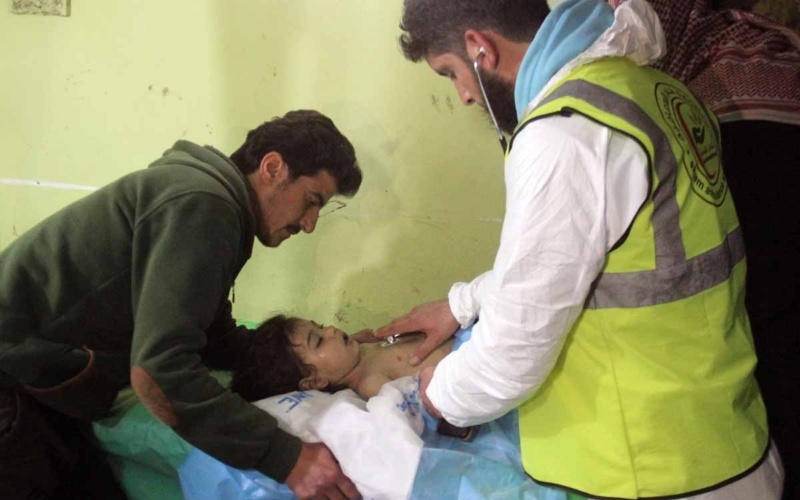A medic treats a victim of the nerve agent attack on Khan Sheikhoun in Idlib Province, April 4, 2017
International inspectors have concluded that the Assad regime used chlorine and sarin in three attacks on a town in northwest Syria in late March 2017.
The report was issued on Wednesday by the Investigations and Identification Team of the Organization for the Prevention of Chemical Weapons. It examined the assaults on the town of Lataminah in northern Hama Province.
The three attacks occurred days before the Assad regime used sarin on the town of Khan Sheikhoun in neighboring southern Idlib Province, killing about 90 people and wounding hundreds.
The IIT concluded that strikes with sarin were carried out by Russian-made Su-22 jets on 24 and 30 March, and a canister with chlorine dropped by a helicopter on 25 March. All flew from the Shayrat airbase, which also launched the Khan Sheikhoun attacks
The munitions used to deliver the chlorine and sarin, which affected about 106 people, were also identified. The names and ranks of the Syrian officers are redacted in the final report.
For years, Russia, the Assad regime, and their supporters have spread propaganda and disinformation over both Lataminah and Khan Sheikhoun, from denial that the attacks occurred to claims that they were carried out by rebels and White Helmets rescuers to tarnish the regime.
But the IIT said all alternative scenarios for the three Lataminah attacks had been considered and dismissed. The investigators said accounts from victims had been corroborated by “interviews directly conducted by the IIT as well as analyses of samples, review of laboratory results, and analyses of munition remnants, reports and advice from experts, specialists, and forensic institutes, along with other relevant material and sources”.
As the investigation progressed, and various hypotheses were considered, the IIT gradually came to these conclusions as the only ones that could reasonably be reached from the information obtained, taken as a whole. Military operations of such a strategic nature as these three attacks only occur pursuant to orders from the highest levels of the Syrian Arab Armed Forces.
The investigators explained that, from “multiple sources”, they had established that Republican Guard commanders had ordered preparations for the attack, including the loading of munitions with sarin, on March 21.
The team said it had reached its conclusions despite refusal by the Assad regime to allow access to the sites of the bombings “as well as persons and information located in the Syrian Arab Republic”.
“Up to UN to Take Action”
OPCW Director General Fernando Arias said of the findings and the blame of the Assad regime, “It is now up to the Executive Council and the Conference of the States Parties to the Chemical Weapons Convention, the United Nations Secretary-General, and the international community as a whole to take any further action they deem appropriate and necessary.”
After the OPCW’s Joint Investigation Mechanism assigned responsibility for the Khan Sheikhoun attack to the Assad regime in October 2017, Russia used a UN Security Council veto to block the extension of the JIM’s mandate.
It tried to prevent examination of other incidents; however, in June 2018 the OPCW’s member-states overwhelmingly voted to create the IIT. The decision was prompted by an April 2018 chlorine attack on the town of Douma, near Syria’s capital Damascus, that killed 43 people.
Russia and pro-Assad activists then tried to undermine the OPCW and IIT with the sustained propaganda campaign.
See also Denying Syria’s Chemical Attacks, Attacking the Inspectors — The Douma Case
The UK Academics Helping Russia Deny Assad’s War Crimes
Douma, the center of the opposition in the East Ghouta region, surrendered on the day after the chlorine attack. Latiminah and Khan Sheikhoun have been overrun by a Russian-regime offensive that began in northwest Syria in April 2019.
Russian State and Assad regime outlets have not mentioned the report, but Mikhail Ulyanov, Moscow’s Ambassador to international organizations in Vienna, blustered:
#OPCW Investigation and Identification Team issued a report attributing three instances of chemical weapons use to Damascus. Why I am not surprised? People have done their job for which they were hired. Could anybody expect anything different? Now the report needs to be analyzed.
— Mikhail Ulyanov (@Amb_Ulyanov) April 8, 2020

